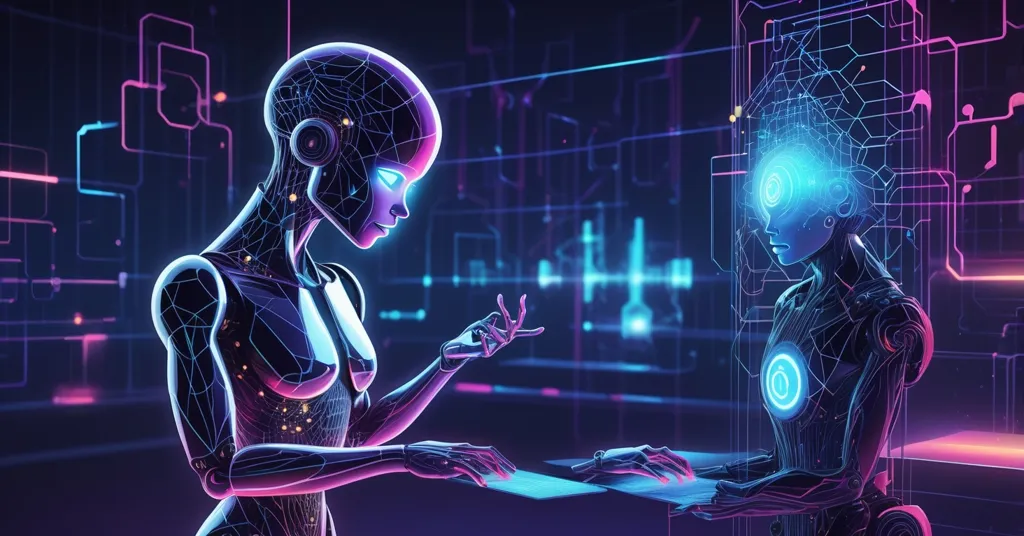YouTube Music’s AI Hosts Spark Privacy Concerns and Blockchain Potential

YouTube Music’s AI Hosts: A Centralized Experiment with Decentralized Lessons for Crypto
YouTube Music is diving headfirst into the AI pool with a new feature in testing: AI music hosts that deliver personalized stories, trivia, and commentary based on your listening habits. While this tech promises a fresh spin on streaming, it also raises questions about privacy, centralization, and user control—issues at the heart of the Bitcoin and blockchain revolution. Let’s unpack this development and explore how the ethos of decentralization could reshape such innovations for the better.
- AI Music Hosts: YouTube Music tests AI-driven hosts for tailored user engagement in the U.S.
- Centralization Concerns: AI personalization risks data monopolies, clashing with crypto’s user-sovereignty ideals.
- Blockchain Potential: Decentralized tech offers solutions for privacy and creator empowerment in streaming.
YouTube Music’s AI Leap: Personalization at What Cost?
YouTube Music’s latest experiment involves AI hosts designed to spice up your streaming experience. Imagine vibing to a playlist when a digital voice jumps in with a quirky anecdote about the artist or some obscure fan trivia. It’s a neat concept, currently being tested with a small group of U.S.-based users, aimed at making your music feel more like a curated storytelling session. This follows Spotify’s lead, who rolled out their AI DJ feature two years back, described by the company as “like having an AI DJ in your pocket,” focusing on tailored playlists and artist insights. YouTube seems to lean more toward narrative engagement—think behind-the-scenes tidbits—though exact details remain under wraps until broader testing feedback emerges.
This feature is part of a larger push through YouTube Labs, a new hub dedicated to AI experimentation, much like Google Labs but focused on platform-specific innovations. As YouTube stated in their announcement:
“YouTube Labs is a new initiative dedicated to exploring the potential of AI on YouTube.”
Unlike some gated features, access to YouTube Labs isn’t tied to a premium subscription—it’s open to all, though testing for things like AI hosts is geographically limited for now. Alongside this, YouTube is rolling out AI tools for creators, particularly for Shorts (their short-form videos), powered by generative AI tech like a custom version of Google’s Veo 3 Fast, which turns text prompts into video content. They’ve also got remixing tools, an “Edit with AI” option, and updates to protect creators’ likeness through a beta feature that flags unauthorized use of facial data in videos—a nod to growing deepfake concerns.
But here’s the rub: for all the shiny bells and whistles, YouTube’s AI push operates within a tightly centralized ecosystem. Every interaction, every data point about your listening habits, feeds into a black box controlled by a tech giant. If you’re a crypto enthusiast, this should set off alarm bells. Bitcoin and blockchain stand for self-sovereignty—owning your money, your data, your identity. So, while YouTube’s personalization tech might feel convenient, it’s worth asking: at what cost to your privacy? And could decentralized principles offer a better path?
The Dark Side of AI: Data Monopolies and “AI Slop”
YouTube isn’t ignoring AI’s potential for abuse entirely. They’ve updated policies to crack down on what’s been termed “AI slop”—think endless streams of low-quality, bot-generated clickbait videos or repetitive content churned out for ad revenue. Creators monetizing this garbage will face penalties, and frankly, it’s about damn time. We’ve seen platforms drown in algorithmically produced trash, diluting real creativity for quick bucks. YouTube swinging the banhammer at these scammers is a rare bit of backbone from Big Tech, but it’s only a Band-Aid on a deeper wound.
The real issue isn’t just bad content—it’s the data monopoly behind AI personalization. YouTube Music’s AI hosts learn from your habits, tracking what you play, skip, or linger on. That data becomes a goldmine for targeted ads or worse, potential leaks or misuse. For those of us who champion privacy (a core tenet of Bitcoin’s ethos), this is a glaring red flag. Centralized platforms hold all the cards, leaving users as little more than data cows to be milked. And while YouTube’s likeness protection tool is a step toward safeguarding creators, it’s still a reactive measure within a system where they control the rules.
Let’s not sugarcoat it: Big Tech’s AI rush often amplifies centralization, not freedom. YouTube’s experiments, while innovative, risk entrenching power further in the hands of a few corporations. Compare that to the crypto space, where projects aim to flip the script—think Bitcoin giving you control over your wealth or Ethereum enabling apps that don’t rely on a single gatekeeper. YouTube’s AI host might sound cool, but without a radical rethink, it’s just another tool to keep you hooked in their walled garden.
Decentralized Alternatives: Blockchain’s Answer to Streaming Woes
So, how does blockchain fit into this? For starters, decentralized tech could tackle the privacy mess head-on. Imagine a music streaming platform where your listening data isn’t hoarded by a central server but instead secured on a blockchain, accessible only via your private key—much like a Bitcoin wallet protects your funds. Protocols like IPFS (InterPlanetary File System) already enable decentralized file storage, cutting out middlemen who could snoop or exploit your info. A streaming app built on such tech could let you enjoy personalized features without sacrificing control.
Then there’s the creator angle. YouTube takes a hefty cut of ad revenue and controls monetization policies, often leaving artists and small creators scraping by. Blockchain-based platforms like Audius are already disrupting this model. Audius uses Ethereum smart contracts—self-executing agreements coded on the blockchain—to ensure transparent, direct payouts to artists whenever their tracks are streamed. No shady middleman, no delayed royalties. If YouTube integrated similar tech, AI hosts could tie into a system where every play triggers a microtransaction in crypto, ensuring fairness. Hell, even NFTs (non-fungible tokens) could let fans buy exclusive merch or tracks directly from artists, cutting out centralized storefronts.
For the uninitiated, smart contracts are like digital vending machines: you input the conditions (say, a listener streams a song), and the output (payment in crypto to the artist) happens automatically, no trust required. This tech, born from Ethereum, is a game-changer for industries like music, where trust in centralized platforms is often misplaced. Pair that with AI for personalization, and you’ve got a streaming future that’s both user-friendly and user-owned.
Counterpoint: Can Big Tech Ever Embrace Decentralization?
Let’s play devil’s advocate for a moment. Could a behemoth like YouTube ever adopt blockchain principles, or is their business model too tied to central control? On one hand, integrating decentralized tech could be a PR win—think “YouTube Music: Powered by Blockchain for Fair Payouts.” It might attract privacy-conscious users and creators tired of opaque policies. Plus, with crypto adoption growing (over 400 million global users hold digital assets as of 2023), tapping into that market isn’t just savvy—it’s inevitable.
On the flip side, centralization is Big Tech’s lifeblood. Data is their currency, more valuable than any altcoin. Expecting YouTube to hand over control via blockchain is like asking a bank to love Bitcoin—it’s a direct threat to their power. More likely, they’ll cherry-pick blockchain buzzwords for marketing while keeping the reins tight. And let’s not kid ourselves: even decentralized platforms have flaws. Audius has faced scalability hiccups, and Ethereum’s gas fees can sting for microtransactions. Decentralization isn’t a silver bullet; it’s a work in progress, just like YouTube’s AI experiments.
Still, the contrast is stark. YouTube’s U.S.-centric testing (leaving global users twiddling their thumbs) shows how centralized rollouts prioritize profit over inclusivity. Crypto, at its best, aims for borderless access—anyone with an internet connection can join the Bitcoin network. That’s the kind of disruption we’re rooting for, even if Big Tech drags its feet.
Effective Accelerationism: Pushing Tech Forward Responsibly
As advocates of effective accelerationism—speeding up innovation with purpose—we see YouTube’s AI push as a double-edged sword. The tech itself is a leap forward, potentially transforming how we engage with content. But without checks on centralization, it’s a gilded cage. Blockchain offers a counterweight, accelerating user empowerment alongside tech progress. We’re not here to bash AI; we’re here to demand it evolves in a way that doesn’t screw over the little guy. YouTube cracking down on AI slop is a start, but true progress would mean decentralizing the data that fuels these tools.
Bitcoin maximalists might scoff at tying music streaming to crypto—why dilute the focus on sound money? Fair point, but altcoins like Ethereum and niche protocols fill gaps Bitcoin doesn’t aim to address. Decentralized streaming isn’t about replacing BTC; it’s about applying the same principles of freedom and disruption to other broken systems. If AI and blockchain can merge to create a fairer, privacy-first music platform, that’s a win for the broader revolution we’re championing.
Key Takeaways and Questions on AI, Streaming, and Crypto
- How do YouTube Music’s AI hosts impact user privacy?
They rely on tracking listening habits, feeding data into a centralized system that could be exploited or leaked, raising concerns for privacy advocates. - What can blockchain offer to counter AI-driven centralization in streaming?
Decentralized tech like IPFS for data storage and Ethereum smart contracts for payouts can secure user data and ensure fair creator compensation without middlemen. - Why is YouTube’s crackdown on AI slop relevant to crypto values?
It mirrors the crypto community’s disdain for scams and low-value schemes, aligning with a push for integrity, though it doesn’t address deeper centralization issues. - Can Big Tech like YouTube adopt decentralized principles for AI innovations?
It’s unlikely due to their reliance on data control, but market pressure from crypto adoption could force incremental steps toward user empowerment. - How does this tie into the broader mission of decentralization?
YouTube’s AI experiments highlight the risks of centralized tech dominance, reinforcing the need for blockchain solutions that prioritize freedom and self-sovereignty.
YouTube Music’s AI hosts are a glimpse into a hyper-personalized future, but they’re also a reminder of Big Tech’s tight grip on our digital lives. For every cool feature, there’s a hidden trade-off in privacy or control—trade-offs that Bitcoin, Ethereum, and decentralized tech aim to obliterate. While we applaud innovation, we’re not here to cheerlead for corporate overreach. The real story is how blockchain can steal the best of AI while ditching the baggage. If you’re in the U.S., you might soon hear an AI host narrate your playlist. But wherever you are, the fight for a freer, user-owned internet is the tune we’re all waiting to stream.



